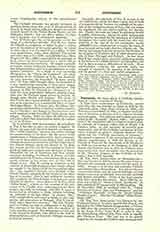

Piusverein, the name given to Catholic associations in various countries of Europe.
I. THE PIUS ASSOCIATION OF GERMANY.
Named after Pius IX, it was founded at Mainz in 1848 by the cathedral canon, Adam Franz Lennig (d. 1866), and Professor Caspar Riffel (d. 1856), to organize the Catholics of Germany in defense of their religious freedom and civil rights. The platform and bylaws were published in the “Katholik” (Mainz, 1848). The organizers of the association called a congress of the Catholic societies of Germany which met at Mainz, 3—October 6, 1848. At this assembly 38 societies were represented, and all the Catholic associations of Germany founded to protect religious interests were united into the “Catholic Association of Germany“. The annual congresses of this association led to other efficient organizations; in 1848 the Society of St. Vincent de Paul and the Association of St. Elizabeth; in 1849 the Association of St. Boniface; in 1850 the Society for Christian Art; in 1851 the Catholic Journeymen’s Union; these assemblies were the precursors of the “General Congress of the Catholics of Germany” that is held annually.
II. THE PIUS ASSOCIATION OF SWITZERLAND.
This was founded in 1855 by Count Theodore Scherer-Boccard who remained at its head until his death (d. 1885). Its aim is to develop and centralize Catholic associational life in Switzerland. It is directed by two central committees, and the general meetings are held nearly every year; in addition, there are also cantonal and district assemblies. Many of the local associations have branches for women. Since 1899 the society was called the “Swiss Catholic Association”; it then contained 225 groups with 35,000 members. On November 22, 1904, it combined with the “United Societies of Catholic Men and Workingmen” and the “Federation Romande” to form the “Swiss Catholic Peoples Union”. (See the “Yearbook” of the Union, Stans, 1907.)
III. THE PIUS ASSOCIATION FOR PROMOTING THE CATHOLIC PRESS OF AUSTRIA, named after Pius X, was founded at the Fifth Catholic Congress held at Vienna in 1905 after the presentation of a convincing report by the Jesuit, Father Victor Kolb, in order to offset the demoralizing Liberal daily Press with an equally able Christian Press. This end was to be gained largely by developing the Catholic daily newspapers of Vienna. The president of the association since its founding has been Count Franz Walterskirchen-Walfstal. In January, 1911, the Pius Association included 840 local groups with a membership of more than 63,000, and headquarters at Vienna. The annual fee is one krone (twenty cents). In 1910 the annual income was 126,000 Kr. ($25,200); of this amount 40,000 Kr. ($8000) went to two daily newspapers of Vienna, the “Reichspost” and the “Vaterland”; 25,000 Kr. ($5000) for campaign purposes and associational periodicals; 5000 Kr. ($1000) for the support of Catholic newspaper writers; 27,000 Kr. ($5400) for a. press and correspondence bureau. The bureau sends daily, Sundays excepted, the “Piusvereinskorrespondenz”, which is six to eight pages in size, to about fifty Christian newspapers. Since 1910 it has also is-sued a supplement for use in different papers and thus contributes largely to the intellectual and religious development of the Catholic provincial Press in Austria. There are 12 diocesan subsidiary councils, besides an Italian section at Triest, and a Czech section at Prague. The money collected outside of Vienna is partially used for the local Press. Since the founding of the Pius Association there has been a very noticeable development of the Catholic Press of Austria, due largely to writings in behalf of the cause and to the holding of meetings, of which there are about 700 yearly; but the desired aim is still far from being realized.
IV. ACADEMIC PIUS ASSOCIATIONS in Germany, for promoting religious interests and attachment to the Church among Catholic students and training them both socially and scientifically, were greatly weakened by the Kulturkampf. In Southern Germany they have recently been organized as the “Unio Piana” or “Union of the Academic Pius Associations”; this union has 9 branch associations with about 1300 members, of whom 800 are regular members. Since 1909 the organ of the association has been “Der Akademiker”.
KARL HILGENREINER

